Attached files
| file | filename |
|---|---|
| 8-K - FORM 8-K - WELLS FARGO & COMPANY/MN | wfc-20210414.htm |
| EX-99.2 - EX-99.2 - WELLS FARGO & COMPANY/MN | wfc1qer04-14x21ex992xsuppl.htm |
| EX-99.1 - EX-99.1 - WELLS FARGO & COMPANY/MN | wfc1qer04-14x21ex991xrelea.htm |

© 2021 Wells Fargo Bank, N.A. All rights reserved. 1Q21 Financial Results April 14, 2021 Exhibit 99.3

21Q21 Financial Results Helped 3.7 million consumer and small business customers by deferring payments and waiving fees Funded approximately 264,000 loans totaling $13.2 billion under the Paycheck Protection Program and facilitated an additional $118 million in liquidity for Community Development Financial Institutions (CDFIs) and African American owned Minority Depository Institutions (MDIs) - More than $6 billion to small businesses located in either a low-to- moderate income (LMI) area or a Majority-Minority census tract - In 1Q21, funded ~70,000 loans totaling $2.8 billion • Average loan size of $40,000, which was down 26% from last year Helped nearly 792,000 homeowners with new low-rate loans to either purchase a home or refinance an existing mortgage: nearly 312,000 purchases and nearly 480,000 refis Since 2012 through February 2021, Wells Fargo has invested $521 million in NeighborhoodLIFT and other LIFT programs to help more than 24,700 individuals and families buy homes by providing homebuyer education and down payment assistance Closed $2.4 billion in new commitments for affordable housing under the GSE and FHA programs (117 properties nationwide with 20,121 total units including 17,776 rent restricted affordable units) Actively helping our customers and communities Supporting Our Customers Supporting Our Communities Charitable Contributions: Deployed $530 million in philanthropic contributions, including: - More than $125 million through the Open for Business Fund granted to 75 CDFIs to help a projected 22,800 small business owners maintain more than 66,000 jobs (August 2020 – March 2021); committed to donating roughly $420 million in grants through 2021 Investing in Minority Depository Institutions (MDIs): In 2020, announced the planned investment of up to $50 million in African American owned MDIs, and have announced 11 investments in 2021 Employee Engagement: Created employee engagement opportunities in 1Q21, including MLK Jr. Day and Black History Month, resulting in 90K+ hours of volunteerism recorded Expanding Spending with Diverse Suppliers: Increased our annual spending to nearly $1.4 billion in 2020, representing 12% of our total controllable spending, and surpassing the financial services industry average of 9.3%1 Supporting Sustainability in Our Communities and in Our Operations All data cited on this slide is from January 1, 2020 – March 31, 2021, unless otherwise noted. 1. Source: Financial Services Roundtable for Supplier Diversity. 2. Renewable energy sources include on-site solar, long-term contracts that support net new sources of offsite renewable energy, and the purchase of renewable energy certificates. Announced goal of achieving net zero greenhouse gas emissions by 2050 - 100% of the company’s global electricity needs met by renewable energy since 20172 Over $11 billion in renewable energy financing since 2006 - The Renewable Energy & Environmental Finance group provided approximately $2.8 billion in financing to the renewable energy industry (January 2020 – March 2021)

31Q21 Financial Results 1Q21 results Financial Results ROE: 10.6% ROTCE: 12.7%1 Efficiency ratio: 77%2 Credit Quality Capital and Liquidity CET1: 11.8%3 LCR: 127%4 Net Income of $4.7 billion, or $1.05 per diluted common share – Revenue of $18.1 billion, up 2% – Noninterest expense of $14.0 billion, up 7% – Results included: Effective income tax rate of 6.4% included net discrete income tax benefits related to closing out prior years’ tax matters Average loans of $873.4 billion, down 9% Average deposits of $1.4 trillion, up 4% Provision for credit losses of $(1.0) billion, down $5.1 billion – Total net charge-offs of $523 million, down $418 million • Net loan charge-offs of 0.24% of average loans (annualized) – Allowance for credit losses for loans of $18.0 billion, down $1.7 billion from 4Q20 Common Equity Tier 1 (CET1) capital of $139.6 billion3 CET1 ratio of 11.8% under the Standardized Approach and 12.6% under the Advanced Approach3 Common stock dividend of $0.10 per share, or $414 million Repurchased 17.2 million shares of common stock, or $596 million, in the quarter Comparisons in the bullet points are for 1Q21 versus 1Q20, unless otherwise noted. 1. Tangible common equity and return on average tangible common equity (ROTCE) are non-GAAP financial measures. For additional information, including a corresponding reconciliation to GAAP financial measures, see the “Tangible Common Equity” table on page 18. 2. The efficiency ratio is noninterest expense divided by total revenue. 3. See page 19 for additional information regarding Common Equity Tier 1 (CET1) capital and ratios. CET1 is a preliminary estimate. 4. Liquidity coverage ratio (LCR) is calculated as high-quality liquid assets divided by projected net cash outflows, as each is defined under the LCR rule. LCR is a preliminary estimate. ($ in millions, except EPS) Pre-tax Income EPS Change in the allowance for credit losses $1,571 0.28 Sale of student loans (Gain = $208 and goodwill write-down = $104) 104 0.02
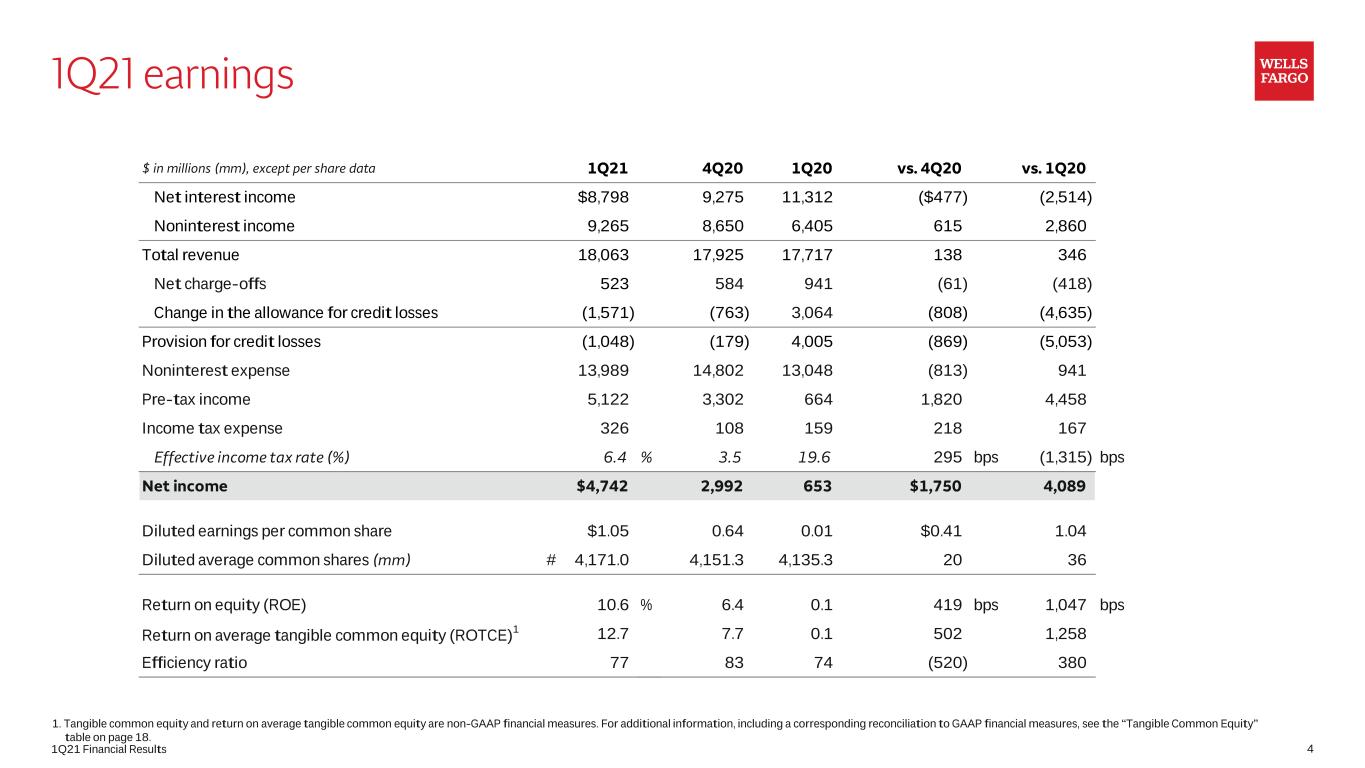
41Q21 Financial Results 1Q21 earnings 1. Tangible common equity and return on average tangible common equity are non-GAAP financial measures. For additional information, including a corresponding reconciliation to GAAP financial measures, see the “Tangible Common Equity” table on page 18. $ in millions (mm), except per share data 1Q21 4Q20 1Q20 vs. 4Q20 vs. 1Q20 Net interest income $8,798 9,275 11,312 ($477) (2,514) Noninterest income 9,265 8,650 6,405 615 2,860 Total revenue 18,063 17,925 17,717 138 346 Net charge-offs 523 584 941 (61) (418) Change in the allowance for credit losses (1,571) (763) 3,064 (808) (4,635) Provision for credit losses (1,048) (179) 4,005 (869) (5,053) Noninterest expense 13,989 14,802 13,048 (813) 941 Pre-tax income 5,122 3,302 664 1,820 4,458 Income tax expense 326 108 159 218 167 Effective income tax rate (%) 6.4 % 3.5 19.6 295 bps (1,315) bps Net income $4,742 2,992 653 $1,750 4,089 Diluted earnings per common share $1.05 0.64 0.01 $0.41 1.04 Diluted average common shares (mm) # 4,171.0 4,151.3 4,135.3 20 36 Return on equity (ROE) 10.6 % 6.4 0.1 419 bps 1,047 bps Return on average tangible common equity (ROTCE)1 12.7 7.7 0.1 502 1,258 Efficiency ratio 77 83 74 (520) 380
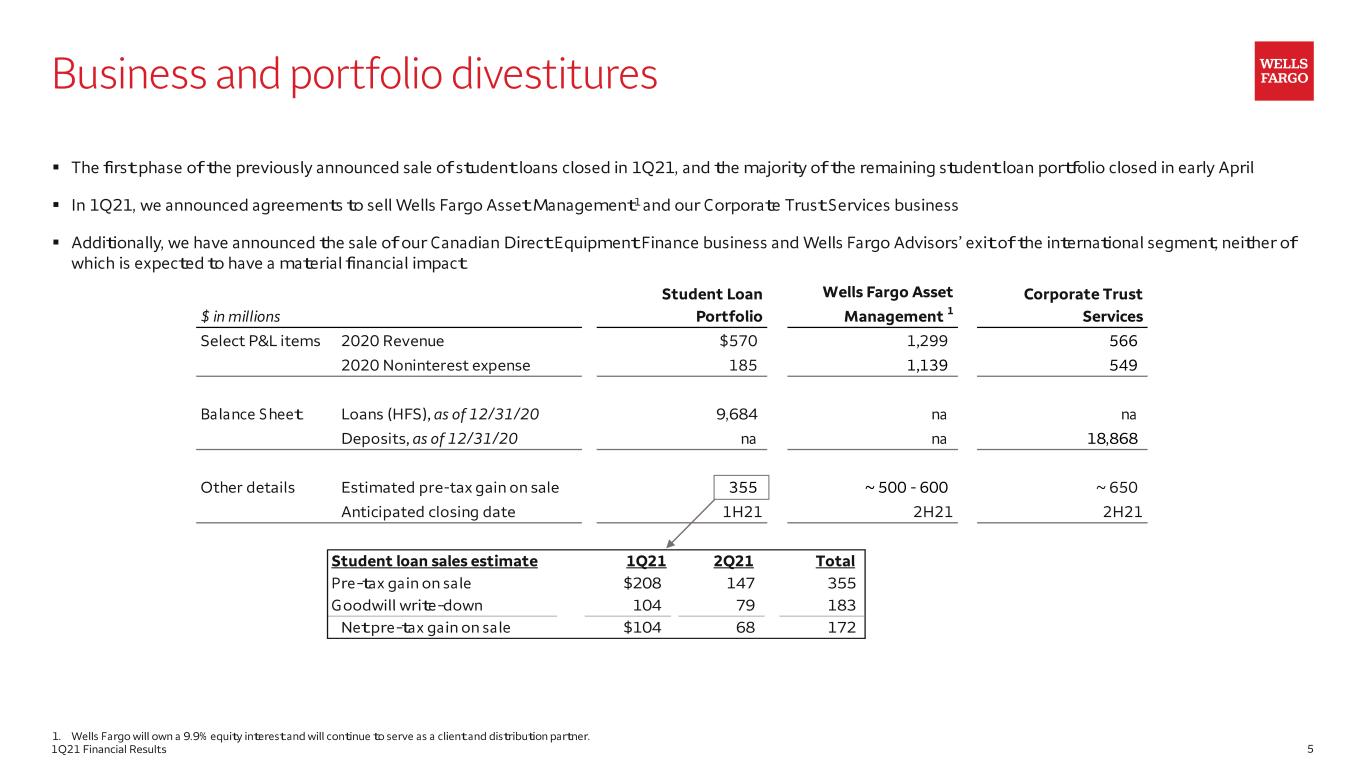
51Q21 Financial Results $ in millions Student Loan Portfolio Wells Fargo Asset Management 1 Corporate Trust Services Select P&L items 2020 Revenue $570 1,299 566 2020 Noninterest expense 185 1,139 549 Balance Sheet Loans (HFS), as of 12/31/20 9,684 na na Deposits, as of 12/31/20 na na 18,868 Other details Estimated pre-tax gain on sale 355 ~ 500 - 600 ~ 650 Anticipated closing date 1H21 2H21 2H21 Business and portfolio divestitures The first phase of the previously announced sale of student loans closed in 1Q21, and the majority of the remaining student loan portfolio closed in early April In 1Q21, we announced agreements to sell Wells Fargo Asset Management1 and our Corporate Trust Services business Additionally, we have announced the sale of our Canadian Direct Equipment Finance business and Wells Fargo Advisors’ exit of the international segment, neither of which is expected to have a material financial impact 1. Wells Fargo will own a 9.9% equity interest and will continue to serve as a client and distribution partner. Student loan sales estimate 1Q21 2Q21 Total Pre-tax gain on sale $208 147 355 Goodwill write-down 104 79 183 Net pre-tax gain on sale $104 68 172

61Q21 Financial Results Credit quality Commercial net loan charge-offs down $159 million on declines across all asset classes including a $116 million decline in commercial real estate losses Consumer net loan charge-offs increased $88 million largely driven by higher losses in other consumer loans and credit card Nonperforming assets decreased $692 million, or 8%, driven by a $673 million decline in nonaccrual loans reflecting declines in commercial nonaccruals primarily driven by a decline in energy and commercial real estate nonaccruals Provision for Credit Losses and Net Charge-offs ($ in millions) Allowance for Credit Losses for Loans ($ in millions) Allowance for credit losses for loans down $1.7 billion due to continued improvements in the economic environment Allowance coverage for total loans down 13 bps from 4Q20, but up 90 bps from 1Q20 due to forecasted credit deterioration in 1Q20 associated with the COVID-19 pandemic Comparisons in the bullet points are for 1Q21 versus 4Q20, unless otherwise noted. 5,279 11,669 11,542 11,516 10,682 6,743 8,767 8,929 8,197 7,361 12,022 20,436 20,471 19,713 18,043 1.19% 2.19% 2.22% 2.22% 2.09% 1Q20 2Q20 3Q20 4Q20 1Q21 Commercial Consumer Allowance coverage for total loans 4,005 9,534 769 (179) (1,048) 941 1,114 731 584 523 0.38% 0.46% 0.29% 0.26% 0.24% 1Q20 2Q20 3Q20 4Q20 1Q21 Provision for Credit Losses Net Charge-offs Net Loan Charge-off Ratio

71Q21 Financial Results Credit quality by operating segment $ in millions Net Charge-offs Change in the Allowance for Credit Losses Total Allocation of Allowance for Credit Losses for Loans (as of 3/31/21) Consumer Banking and Lending $370 (789) (419) $8,782 Commerical Banking 39 (438) (399) 4,138 Corporate and Investment Banking 37 (321) (284) 4,798 Wealth and Investment Management - (43) (43) 332 Corporate 77 20 97 (7) Total $523 (1,571) (1,048) $18,043 1Q21 Provision for Credit Losses

81Q21 Financial Results Average loans and deposits Average loans down $91.6 billion, or 9%, year-over-year (YoY), and down $26.3 billion, or 3%, from 4Q20 on lower consumer loans predominantly driven by a $23.0 billion decline in consumer real estate loans Total average loan yield of 3.33%, down 6 bps from 4Q20 and down 87 bps YoY reflecting the repricing impacts of lower interest rates, as well as lower consumer real estate loans Average deposits up $55.5 billion, or 4%, YoY, and up $13.4 billion, or 1%, from 4Q20 as growth in Consumer Banking and Lending, Wealth and Investment Management, and Commercial Banking deposits was partially offset by targeted actions to manage to the asset cap, primarily in Corporate and Investment Banking, and Corporate Treasury Average deposit cost of 3 bps, down 2 bps from 4Q20 and 49 bps YoY reflecting the lower interest rate environment Average Loans Outstanding ($ in billions) Average Deposits and Rates ($ in billions) Average Deposit Cost 0.52% 0.17% 0.09% 0.05% 0.03% 520.5 545.3 497.7 476.5 476.6 444.5 426.0 434.0 423.2 396.8 965.0 971.3 931.7 899.7 873.4 4.20% 3.50% 3.41% 3.39% 3.33% 1Q20 2Q20 3Q20 4Q20 1Q21 Commercial Loans Consumer Loans Total Average Loan Yield 652.7 715.1 756.5 763.2 789.4 193.5 206.5 198.0 203.6 208.0 266.2 239.6 226.1 205.8 194.5 145.4 165.2 169.5 169.9 173.7 80.2 60.2 49.0 37.7 27.9 1,338.0 1,386.7 1,399.0 1,380.1 1,393.5 1Q20 2Q20 3Q20 4Q20 1Q21 Corporate Wealth and Investment Management Corporate and Investment Banking Commercial Banking Consumer Banking and Lending

91Q21 Financial Results Net interest income Net interest income decreased $2.5 billion, or 22%, YoY reflecting the impact of lower interest rates, which drove a repricing of the balance sheet, lower loan balances due to soft demand and elevated prepayments, as well as unfavorable hedge ineffectiveness accounting results, and higher mortgage-backed securities (MBS) premium amortization – 1Q21 MBS premium amortization was $616 million vs. $361 million in 1Q20 and $646 million in 4Q20 Net interest income decreased $477 million, or 5%, from 4Q20 reflecting 2 fewer days in the quarter, unfavorable hedge ineffectiveness accounting results, continued repricing of the balance sheet, and lower loan balances Net Interest Income ($ in millions) 11,312 9,880 9,368 9,275 8,798 2.58% 2.25% 2.13% 2.13% 2.05% 1Q20 2Q20 3Q20 4Q20 1Q21 Net Interest Income Net Interest Margin

101Q21 Financial Results Noninterest expense Noninterest Expense ($ in millions) Noninterest expense up 7% from 1Q20 – Personnel expense up 15% • Higher incentives and revenue-related compensation, including the impact of higher market valuations on stock-based compensation • 1Q21 deferred compensation expense was $5 million vs. $(598) million in 1Q20 • Partially offset by a decline in salaries expense on lower headcount – 1Q21 included a $104 million goodwill write-down related to the sale of student loans – All other expense down 4% on lower professional services expense largely driven by efficiency initiatives, as well as lower advertising and promotion expense Noninterest expense down 5% from 4Q20 – Personnel expense up 7% due to seasonally higher payroll tax and 401(k) plan expense, as well as higher incentives and revenue-related compensation – Non-personnel expense down $1.4 billion, or 24%, largely driven by lower restructuring charges and lower operating losses 8,323 8,916 8,624 8,948 9,558 464 1,219 1,219 621 213 718 781 13 4,261 4,416 4,668 4,452 4,101 104 13,048 14,551 15,229 14,802 13,989 1Q20 2Q20 3Q20 4Q20 1Q21 Goodwill Write-down All Other Expenses Restructuring Charges Operating Losses Personnel Expense 1Q20 2Q20 3Q20 4Q20 1Q21 272 276 275 269 265 Headcount (Period-end, '000s)

111Q21 Financial Results Consumer Banking and Lending Total revenue up modestly YoY and from 4Q20 – CSBB down 6% YoY primarily due to the impact of lower interest rates and lower deposit-related fees on higher average checking account balances and higher COVID-19 related fee waivers – Home Lending up 19% YoY on higher retail originations and gain on sale margins, partially offset by lower gains on loan portfolio sales and lower net interest income, and up 12% from 4Q20 due to higher mortgage banking income primarily related to the re-securitization of loans we purchased from mortgage-backed securities last year and higher retail originations – Credit Card down 2% both YoY and from 4Q20 primarily driven by lower loan balances Noninterest expense down 3% from 4Q20 driven by lower operating losses, professional services expense, and advertising and promotion expense 1. Return on allocated capital is segment net income (loss) applicable to common stock divided by segment average allocated capital. Segment net income (loss) applicable to common stock is segment net income (loss) less allocated preferred stock dividends. 2. Efficiency ratio is segment noninterest expense divided by segment total revenue. 3. Digital and mobile active customers is the number of consumer and small business customers who have logged on via a digital or mobile device, respectively, in the prior 90 days. $ in millions (mm) 1Q21 vs. 4Q20 vs. 1Q20 Revenue by line of business: Consumer and Small Business Banking (CSBB) $4,550 ($151) (311) Consumer Lending: Home Lending 2,227 232 351 Credit Card 1,346 (26) (29) Auto 403 - 23 Personal Lending 128 (14) (29) Total revenue 8,654 41 5 Provision for credit losses (419) (770) (1,988) Noninterest expense 6,267 (174) 10 Pre-tax income 2,806 985 1,983 Net income $2,104 $740 1,486 1Q21 4Q20 1Q20 Return on allocated capital1 17.2 % 10.7 4.6 Efficiency ratio2 72 75 72 Retail bank branches # 4,944 5,032 5,329 Digital (online and mobile) active customers3 (mm) 32.9 32.0 31.1 Mobile active customers3 (mm) 26.7 26.0 24.9 Selected Metrics $ in billions 1Q21 4Q20 1Q20 Balances Loans $353.1 373.9 382.6 Deposits 789.4 763.2 652.7 Credit Performance Net charge-offs as a % of average loans 0.42 % 0.35 0.65 Average Balances and Selected Credit Metrics Summary Financials

121Q21 Financial Results Consumer Banking and Lending Mortgage Loan Originations ($ in billions) Auto Loan Originations ($ in billions) Credit Card POS Volume ($ in billions) Debit Card Point of Sale (POS) Volume and Transactions1 1. Debit card purchase volume and transactions reflect combined activity for both consumer and business debit card purchases. 90.6 93.1 102.9 105.3 108.5 2.2 2.0 2.3 2.3 2.3 1Q20 2Q20 3Q20 4Q20 1Q21 POS Volume ($ in billions) POS Transactions (billions) 23.1 30.5 32.8 32.3 33.6 24.9 28.7 28.8 21.6 18.2 48.0 59.2 61.6 53.9 51.8 52% 62% 51% 52% 64% 1Q20 2Q20 3Q20 4Q20 1Q21 Retail Correspondent Refinances as a % of Originations 6.5 5.6 5.4 5.3 7.0 1Q20 2Q20 3Q20 4Q20 1Q21 19.9 17.5 21.3 22.9 21.1 1Q20 2Q20 3Q20 4Q20 1Q21
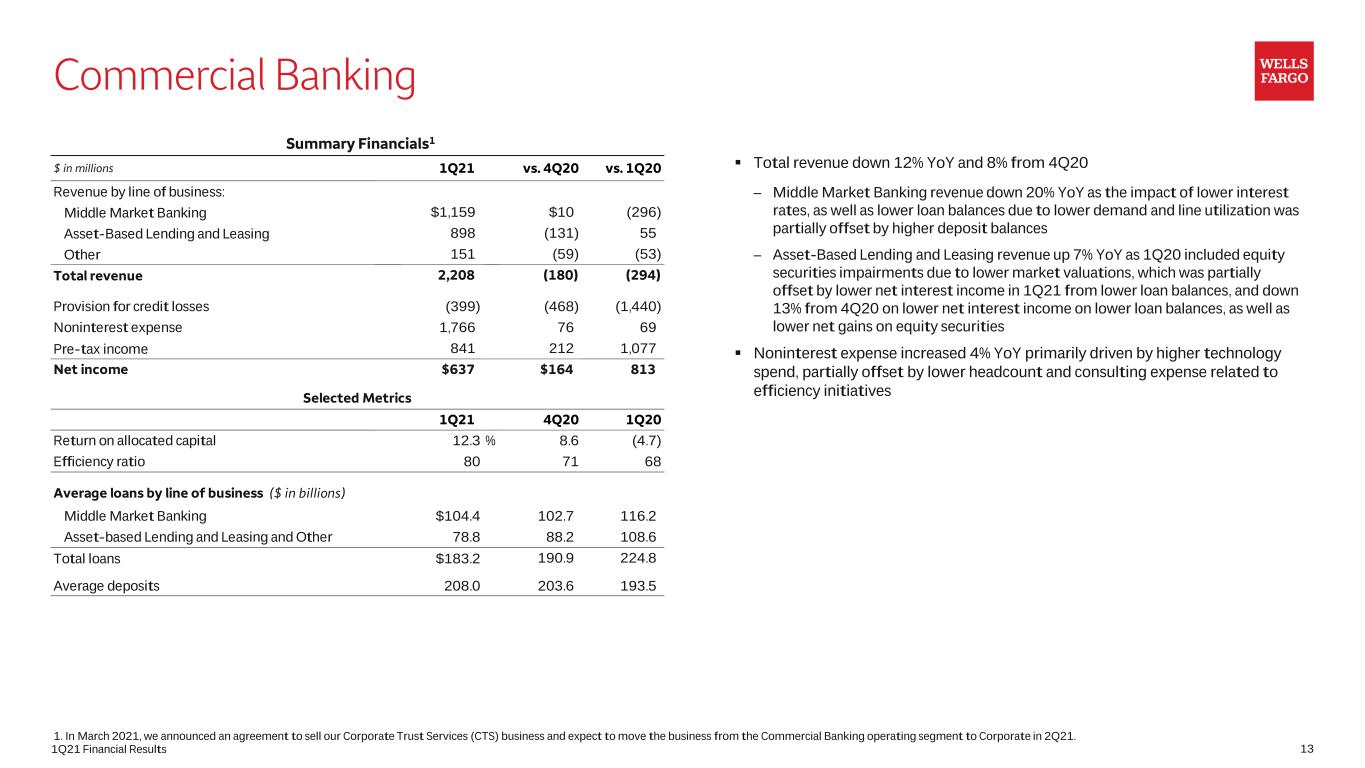
131Q21 Financial Results Commercial Banking Total revenue down 12% YoY and 8% from 4Q20 – Middle Market Banking revenue down 20% YoY as the impact of lower interest rates, as well as lower loan balances due to lower demand and line utilization was partially offset by higher deposit balances – Asset-Based Lending and Leasing revenue up 7% YoY as 1Q20 included equity securities impairments due to lower market valuations, which was partially offset by lower net interest income in 1Q21 from lower loan balances, and down 13% from 4Q20 on lower net interest income on lower loan balances, as well as lower net gains on equity securities Noninterest expense increased 4% YoY primarily driven by higher technology spend, partially offset by lower headcount and consulting expense related to efficiency initiatives $ in millions 1Q21 vs. 4Q20 vs. 1Q20 Revenue by line of business: Middle Market Banking $1,159 $10 (296) Asset-Based Lending and Leasing 898 (131) 55 Other 151 (59) (53) Total revenue 2,208 (180) (294) Provision for credit losses (399) (468) (1,440) Noninterest expense 1,766 76 69 Pre-tax income 841 212 1,077 Net income $637 $164 813 1Q21 4Q20 1Q20 Return on allocated capital 12.3 % 8.6 (4.7) Efficiency ratio 80 71 68 Average loans by line of business ($ in billions) Middle Market Banking $104.4 102.7 116.2 Asset-based Lending and Leasing and Other 78.8 88.2 108.6 Total loans $183.2 190.9 224.8 Average deposits 208.0 203.6 193.5 Selected Metrics 1. In March 2021, we announced an agreement to sell our Corporate Trust Services (CTS) business and expect to move the business from the Commercial Banking operating segment to Corporate in 2Q21. Summary Financials1
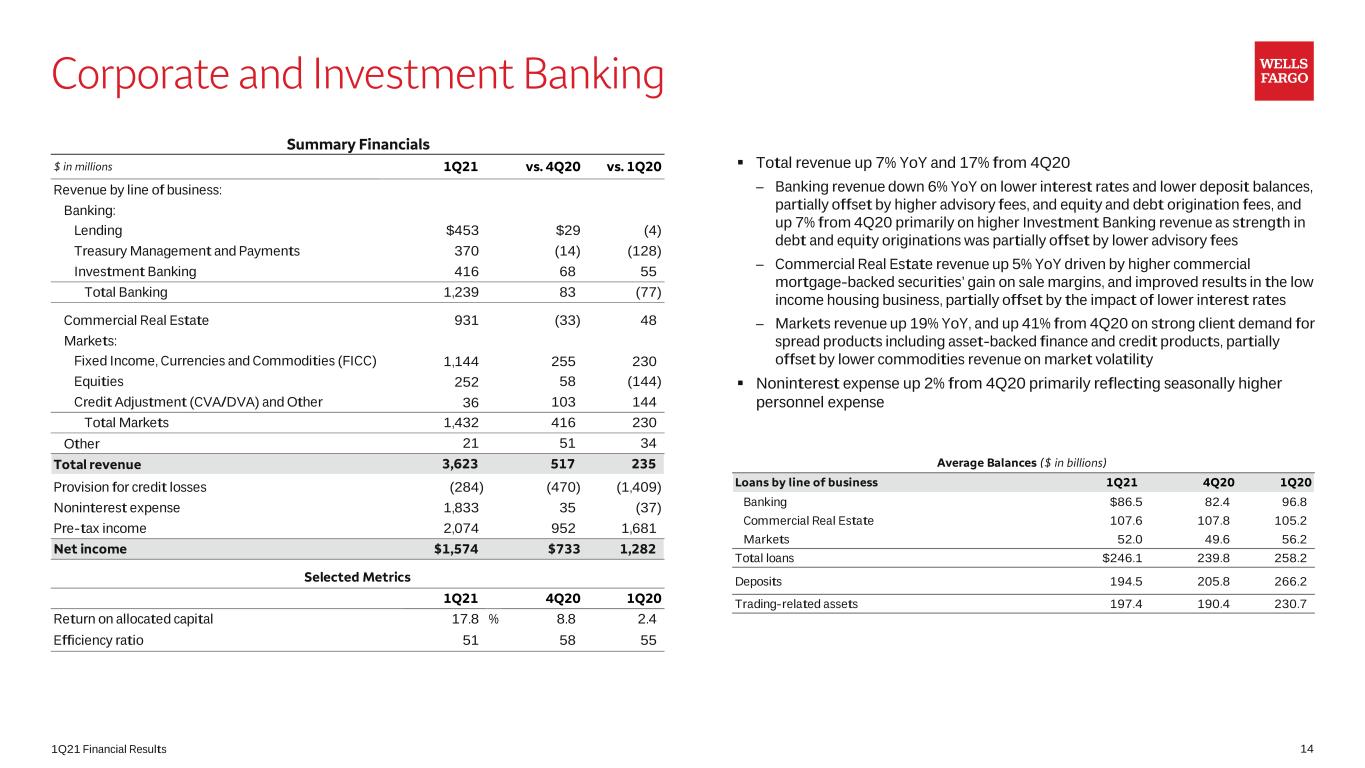
141Q21 Financial Results Summary Financials Corporate and Investment Banking Total revenue up 7% YoY and 17% from 4Q20 – Banking revenue down 6% YoY on lower interest rates and lower deposit balances, partially offset by higher advisory fees, and equity and debt origination fees, and up 7% from 4Q20 primarily on higher Investment Banking revenue as strength in debt and equity originations was partially offset by lower advisory fees – Commercial Real Estate revenue up 5% YoY driven by higher commercial mortgage-backed securities’ gain on sale margins, and improved results in the low income housing business, partially offset by the impact of lower interest rates – Markets revenue up 19% YoY, and up 41% from 4Q20 on strong client demand for spread products including asset-backed finance and credit products, partially offset by lower commodities revenue on market volatility Noninterest expense up 2% from 4Q20 primarily reflecting seasonally higher personnel expense $ in millions 1Q21 vs. 4Q20 vs. 1Q20 Revenue by line of business: Banking: Lending $453 $29 (4) Treasury Management and Payments 370 (14) (128) Investment Banking 416 68 55 Total Banking 1,239 83 (77) Commercial Real Estate 931 (33) 48 Markets: Fixed Income, Currencies and Commodities (FICC) 1,144 255 230 Equities 252 58 (144) Credit Adjustment (CVA/DVA) and Other 36 103 144 Total Markets 1,432 416 230 Other 21 51 34 Total revenue 3,623 517 235 Provision for credit losses (284) (470) (1,409) Noninterest expense 1,833 35 (37) Pre-tax income 2,074 952 1,681 Net income $1,574 $733 1,282 1Q21 4Q20 1Q20 Return on allocated capital 17.8 % 8.8 2.4 Efficiency ratio 51 58 55 Selected Metrics Loans by line of business 1Q21 4Q20 1Q20 Banking $86.5 82.4 96.8 Commercial Real Estate 107.6 107.8 105.2 Markets 52.0 49.6 56.2 Total loans $246.1 239.8 258.2 Deposits 194.5 205.8 266.2 Trading-related assets 197.4 190.4 230.7 Average Balances ($ in billions)
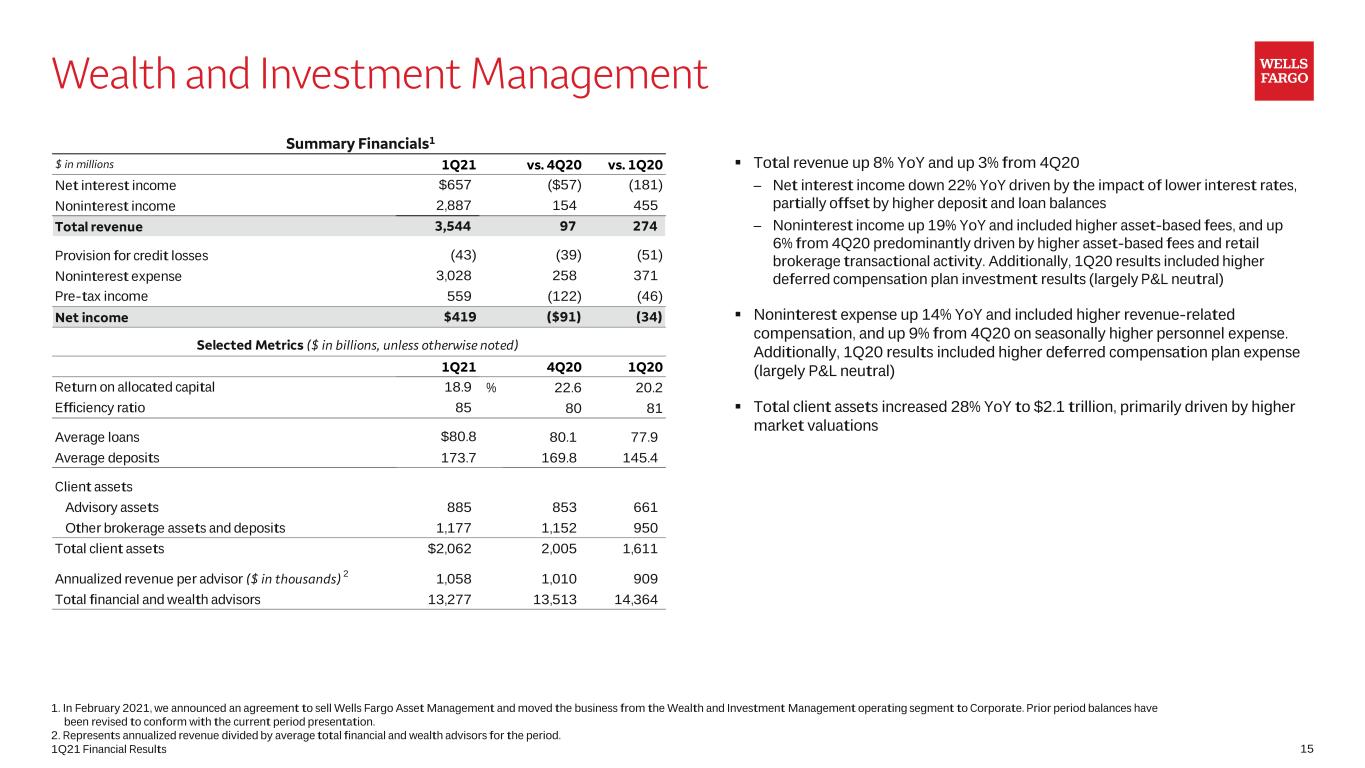
151Q21 Financial Results Wealth and Investment Management Total revenue up 8% YoY and up 3% from 4Q20 – Net interest income down 22% YoY driven by the impact of lower interest rates, partially offset by higher deposit and loan balances – Noninterest income up 19% YoY and included higher asset-based fees, and up 6% from 4Q20 predominantly driven by higher asset-based fees and retail brokerage transactional activity. Additionally, 1Q20 results included higher deferred compensation plan investment results (largely P&L neutral) Noninterest expense up 14% YoY and included higher revenue-related compensation, and up 9% from 4Q20 on seasonally higher personnel expense. Additionally, 1Q20 results included higher deferred compensation plan expense (largely P&L neutral) Total client assets increased 28% YoY to $2.1 trillion, primarily driven by higher market valuations 1. In February 2021, we announced an agreement to sell Wells Fargo Asset Management and moved the business from the Wealth and Investment Management operating segment to Corporate. Prior period balances have been revised to conform with the current period presentation. 2. Represents annualized revenue divided by average total financial and wealth advisors for the period. $ in millions 1Q21 vs. 4Q20 vs. 1Q20 Net interest income $657 ($57) (181) Noninterest income 2,887 154 455 Total revenue 3,544 97 274 Provision for credit losses (43) (39) (51) Noninterest expense 3,028 258 371 Pre-tax income 559 (122) (46) Net income $419 ($91) (34) 1Q21 4Q20 1Q20 Return on allocated capital 18.9 % 22.6 20.2 Efficiency ratio 85 80 81 Average loans $80.8 80.1 77.9 Average deposits 173.7 169.8 145.4 Client assets Advisory assets 885 853 661 Other brokerage assets and deposits 1,177 1,152 950 Total client assets $2,062 2,005 1,611 Annualized revenue per advisor ($ in thousands) 2 1,058 1,010 909 Total financial and wealth advisors 13,277 13,513 14,364 Selected Metrics ($ in billions, unless otherwise noted) Summary Financials1

161Q21 Financial Results Corporate Net interest income down YoY primarily due to the impact of lower interest rates and unfavorable hedge ineffectiveness accounting results Noninterest income up YoY from a 1Q20 that included equity impairments in our affiliated venture capital and private equity partnerships, and a $208 million gain on the sale of student loans in 1Q21 Provision for credit losses up from a 4Q20 that included a $757 million reserve release due to the announced sale of our student loan portfolio Noninterest expense down from 4Q20 on lower restructuring charges $ in millions 1Q21 vs. 4Q20 vs. 1Q20 Net interest income ($430) ($158) (1,249) Noninterest income 1,319 (270) 1,438 Total revenue 889 (428) 189 Provision for credit losses 97 878 (165) Noninterest expense 1,095 (1,008) 528 Pre-tax income (loss) (303) (298) (174) Income tax expense (benefit) (364) (354) (918) Less: Net income (loss) from noncontrolling interests 53 (148) 202 Net income (loss) $8 $204 542 1Q21 4Q20 1Q20 Wells Fargo Asset Management assets under management $590 603 518 Selected Metrics ($ in billions) 1. In February 2021, we announced an agreement to sell Wells Fargo Asset Management and moved the business from the Wealth and Investment Management operating segment to Corporate. In March 2021, we announced an agreement to sell our Corporate Trust Services (CTS) business and expect to move the business from the Commercial Banking operating segment to Corporate in 2Q21. Prior period balances have been revised to conform with the current period presentation. Summary Financials1

Appendix

181Q21 Financial Results Tangible Common Equity Wells Fargo & Company and Subsidiaries TANGIBLE COMMON EQUITY We also evaluate our business based on certain ratios that utilize tangible common equity. Tangible common equity is a non-GAAP financial measure and represents total equity less preferred equity, noncontrolling interests, goodwill, certain identifiable intangible assets (other than MSRs) and goodwill and other intangibles on nonmarketable equity securities, net of applicable deferred taxes. One of these ratios is return on average tangible common equity (ROTCE), which represents our annualized earnings as a percentage of tangible common equity. The methodology of determining tangible common equity may differ among companies. Management believes that return on average tangible common equity, which utilizes tangible common equity, is a useful financial measure because it enables management, investors, and others to assess the Company’s use of equity. The table below provides a reconciliation of this non-GAAP financial measure to GAAP financial measures. Quarter ended (in millions, except ratios) Mar 31, 2021 Dec 31, 2020 Sep 30, 2020 Jun 30, 2020 Mar 31, 2020 Return on average tangible common equity: Net income applicable to common stock (A) $ 4,363 2,642 1,720 (2,694) 42 Average total equity 189,332 185,748 182,850 184,108 188,170 Adjustments: Preferred stock (21,840) (21,223) (21,098) (21,344) (21,794) Additional paid-in capital on preferred stock 145 156 158 140 135 Unearned ESOP shares 875 875 875 1,140 1,143 Noncontrolling interests (1,115) (887) (761) (643) (785) Average common stockholders’ equity (B) 167,397 164,669 162,024 163,401 166,869 Adjustments: Goodwill (26,383) (26,390) (26,388) (26,384) (26,387) Certain identifiable intangible assets (other than MSRs) (330) (354) (378) (402) (426) Goodwill and other intangibles on nonmarketable equity securities (included in other assets) (2,217) (1,889) (2,045) (1,922) (2,152) Applicable deferred taxes related to goodwill and other intangible assets (1) 863 852 838 828 818 Average tangible common equity (C) $ 139,330 136,888 134,051 135,521 138,722 Return on average common stockholders’ equity (ROE) (annualized) (A)/(B) 10.6 % 6.4 4.2 (6.6) 0.1 Return on average tangible common equity (ROTCE) (annualized) (A)/(C) 12.7 7.7 5.1 (8.0) 0.1 (1) Determined by applying the combined federal statutory rate and composite state income tax rates to the difference between book and tax basis of the respective goodwill and intangible assets at period end.

191Q21 Financial Results Common Equity Tier 1 under Basel III Wells Fargo & Company and Subsidiaries RISK-BASED CAPITAL RATIOS UNDER BASEL III (1) Estimated (in billions, except ratio) Mar 31, 2021 Dec 31, 2020 Sep 30, 2020 Jun 30, 2020 Mar 31, 2020 Total equity $ 188.3 185.9 182.0 180.1 183.3 Adjustments: Preferred stock (21.2) (21.1) (21.1) (21.1) (21.3) Additional paid-in capital on preferred stock 0.2 0.1 0.2 0.1 0.1 Unearned ESOP shares 0.9 0.9 0.9 0.9 1.1 Noncontrolling interests (1.1) (1.0) (0.9) (0.7) (0.6) Total common stockholders' equity 167.1 164.8 161.1 159.3 162.6 Adjustments: Goodwill (26.3) (26.4) (26.4) (26.4) (26.4) Certain identifiable intangible assets (other than MSRs) (0.3) (0.3) (0.4) (0.4) (0.4) Goodwill and other intangibles on nonmarketable equity securities (included in other assets) (2.3) (2.0) (2.0) (2.1) (1.9) Applicable deferred taxes related to goodwill and other intangible assets (2) 0.9 0.9 0.8 0.8 0.8 CECL transition provision (3) 1.3 1.7 1.9 1.9 — Other (0.8) (0.4) (0.1) (0.1) — Common Equity Tier 1 (A) 139.6 138.3 134.9 133.0 134.7 Total risk-weighted assets (RWAs) under Standardized Approach (B) $ 1,179.4 1,193.7 1,185.6 1,213.1 1,262.8 Total RWAs under Advanced Approach (C) 1,112.2 1,158.4 1,172.0 1,195.4 1,181.3 Common Equity Tier 1 to total RWAs under Standardized Approach (A)/(B) 11.8 % 11.6 11.4 11.0 10.7 Common Equity Tier 1 to total RWAs under Advanced Approach (A)/(C) 12.6 11.9 11.5 11.1 11.4 (1) The Basel III capital rules for calculating CET1 and tier 1 capital, along with risk-weighted assets (RWAs), are fully phased-in. However, the requirements for determining total capital are still in accordance with Transition Requirements and are scheduled to be fully phased-in by the end of 2021. The Basel III capital rules provide for two capital frameworks: the Standardized Approach and the Advanced Approach applicable to certain institutions. Accordingly, in the assessment of our capital adequacy, we must report the lower of our CET1, tier 1 and total capital ratios calculated under the Standardized Approach and under the Advanced Approach. (2) Determined by applying the combined federal statutory rate and composite state income tax rates to the difference between book and tax basis of the respective goodwill and intangible assets at period end. (3) In second quarter 2020, the Company elected to apply a modified transition provision issued by federal banking regulators related to the impact of the current expected credit loss (CECL) accounting standard on regulatory capital. The rule permits certain banking organizations to exclude from regulatory capital the initial adoption impact of CECL, plus 25% of the cumulative changes in the allowance for credit losses (ACL) under CECL for each period until December 31, 2021, followed by a three-year phase-out of the benefits. The impact of the CECL transition provision on our regulatory capital at March 31, 2021, was an increase in capital of $1.3 billion, reflecting a $991 million (post-tax) increase in capital recognized upon our initial adoption of CECL, offset by 25% of the $9.2 billion increase in our ACL under CECL from January 1, 2020, through March 31, 2021.
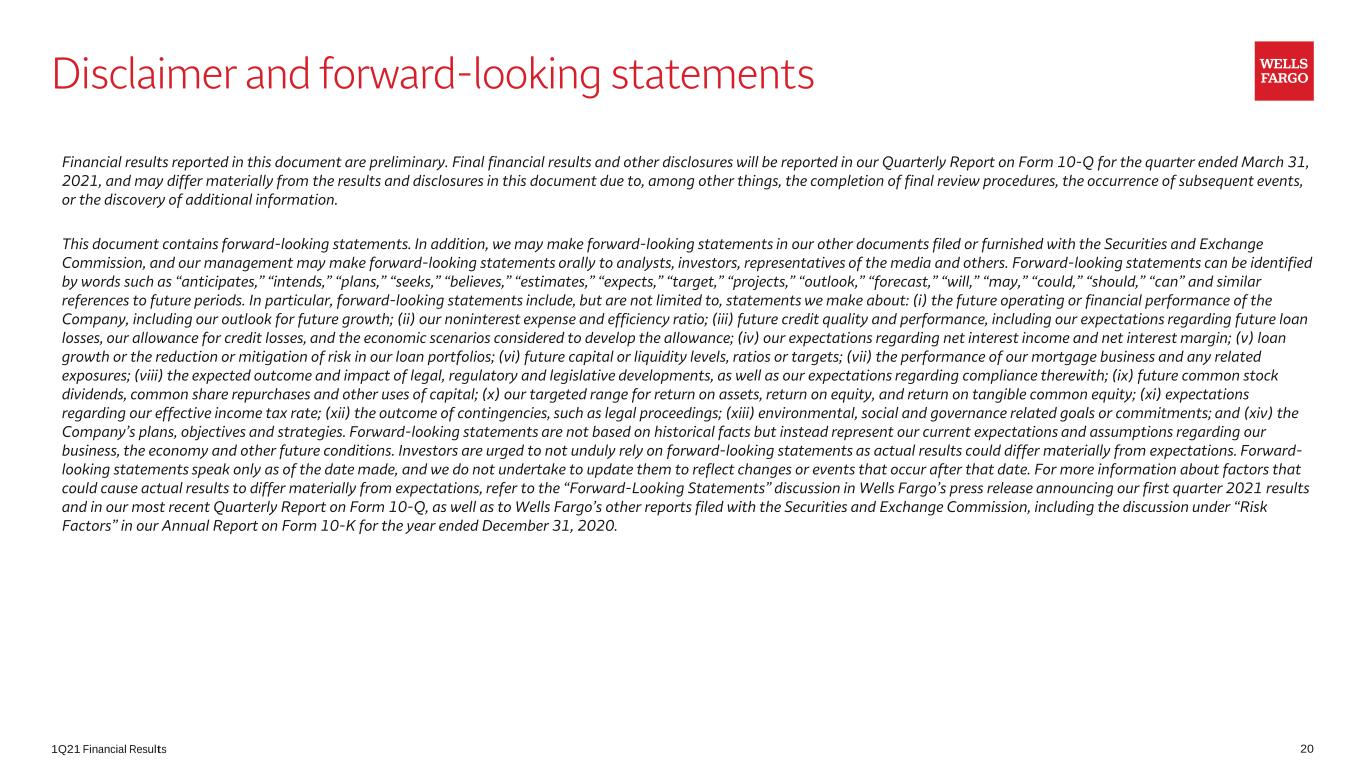
201Q21 Financial Results Disclaimer and forward-looking statements Financial results reported in this document are preliminary. Final financial results and other disclosures will be reported in our Quarterly Report on Form 10-Q for the quarter ended March 31, 2021, and may differ materially from the results and disclosures in this document due to, among other things, the completion of final review procedures, the occurrence of subsequent events, or the discovery of additional information. This document contains forward-looking statements. In addition, we may make forward-looking statements in our other documents filed or furnished with the Securities and Exchange Commission, and our management may make forward-looking statements orally to analysts, investors, representatives of the media and others. Forward-looking statements can be identified by words such as “anticipates,” “intends,” “plans,” “seeks,” “believes,” “estimates,” “expects,” “target,” “projects,” “outlook,” “forecast,” “will,” “may,” “could,” “should,” “can” and similar references to future periods. In particular, forward-looking statements include, but are not limited to, statements we make about: (i) the future operating or financial performance of the Company, including our outlook for future growth; (ii) our noninterest expense and efficiency ratio; (iii) future credit quality and performance, including our expectations regarding future loan losses, our allowance for credit losses, and the economic scenarios considered to develop the allowance; (iv) our expectations regarding net interest income and net interest margin; (v) loan growth or the reduction or mitigation of risk in our loan portfolios; (vi) future capital or liquidity levels, ratios or targets; (vii) the performance of our mortgage business and any related exposures; (viii) the expected outcome and impact of legal, regulatory and legislative developments, as well as our expectations regarding compliance therewith; (ix) future common stock dividends, common share repurchases and other uses of capital; (x) our targeted range for return on assets, return on equity, and return on tangible common equity; (xi) expectations regarding our effective income tax rate; (xii) the outcome of contingencies, such as legal proceedings; (xiii) environmental, social and governance related goals or commitments; and (xiv) the Company’s plans, objectives and strategies. Forward-looking statements are not based on historical facts but instead represent our current expectations and assumptions regarding our business, the economy and other future conditions. Investors are urged to not unduly rely on forward-looking statements as actual results could differ materially from expectations. Forward- looking statements speak only as of the date made, and we do not undertake to update them to reflect changes or events that occur after that date. For more information about factors that could cause actual results to differ materially from expectations, refer to the “Forward-Looking Statements” discussion in Wells Fargo’s press release announcing our first quarter 2021 results and in our most recent Quarterly Report on Form 10-Q, as well as to Wells Fargo’s other reports filed with the Securities and Exchange Commission, including the discussion under “Risk Factors” in our Annual Report on Form 10-K for the year ended December 31, 2020.
